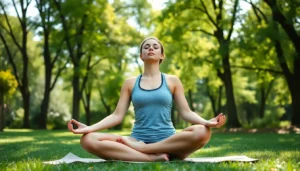Table of Contents
ToggleIn a world where self-care often feels like a luxury rather than a necessity, understanding how well individuals manage their own well-being is crucial. Performance assessment of self-care skills isn’t just about checking off boxes; it’s about empowering people to take charge of their lives. Think of it as a personal trainer for your daily routines—minus the sweat and the spandex.
Imagine being able to identify where someone excels in their self-care game and where they might need a little extra help. This assessment can unveil hidden talents, like the ability to whip up a gourmet meal from leftovers or the uncanny skill of binge-watching an entire series in one weekend. With the right tools and insights, everyone can become a self-care superstar, leading to happier and healthier lives.
Overview of Self-Care Skills
Self-care skills encompass activities that individuals perform to maintain their physical, emotional, and mental well-being. These skills include personal hygiene, nutrition, exercise, and stress management techniques. Individuals develop self-care skills through practice and reflection, leading to enhanced quality of life.
Effective personal hygiene routines play a crucial role in self-care. Activities such as regular handwashing and dental care contribute to overall health and prevent illness. Nutrition also significantly impacts well-being. Eating a balanced diet with fruits, vegetables, lean proteins, and whole grains helps sustain energy levels and supports mental clarity.
Exercise serves as another essential self-care skill. Regular physical activity reduces stress and promotes emotional resilience. Incorporating activities like walking, jogging, or yoga can enhance both physical and mental health. Stress management techniques, such as mindfulness and deep breathing, empower individuals to cope with daily challenges effectively.
Assessing one’s self-care skills reveals strengths and areas for improvement. Identifying which skills are already strong aids in reinforcing positive behaviors. Analyzing areas in need of enhancement provides targeted opportunities for growth. It’s important to personalize self-care practices according to individual preferences and lifestyles to maximize effectiveness.
Resources for improving self-care skills include workshops, online courses, and self-help books. Engaging with these resources fosters greater understanding and better implementation of self-care practices. As individuals embrace self-assessment, they cultivate self-awareness and assert their capacity to prioritize their well-being.
Importance of Performance Assessment

Performance assessment of self-care skills plays a crucial role in enhancing overall well-being. This assessment identifies personal strengths, highlights areas for improvement, and fosters individual growth.
Benefits for Individuals
Individuals gain insights into their self-care abilities through performance assessments. These evaluations promote self-discovery and awareness, allowing them to tailor their routines. Recognizing strengths encourages confidence, while identifying weaknesses presents opportunities for development. A survey by the National Institute of Health indicates that individuals who regularly assess their self-care skills report a 25% increase in daily satisfaction. Personalized assessment tools offer actionable steps for improving physical and mental well-being. Implementing changes based on clear insights leads to healthier lifestyles and better emotional resilience.
Benefits for Caregivers
Caregivers benefit significantly from understanding the self-care skills of those they support. By assessing these skills, caregivers can create targeted support plans that enhance the efficacy of care. Improved assessment processes lead to more effective communication, ensuring that needs are met accurately. Research from AARP reveals that caregivers who engage in performance assessments report a 30% decrease in caregiver stress levels. This proactive approach cultivates stronger relationships and increases the quality of care provided. Ultimately, ongoing assessments facilitate a more holistic understanding of individual needs, promoting well-being for both caregivers and those receiving care.
Methods of Performance Assessment
Performance assessments of self-care skills utilize various methods to evaluate and enhance individual capabilities. Two prominent approaches include standardized tools and observational techniques.
Standardized Tools
Standardized tools serve as essential instruments for assessing self-care skills. These assessment methods deliver reliable and valid metrics that evaluate various self-care domains, such as personal hygiene and stress management. Examples include the Self-Care Inventory and the Katz Index of Independence in Activities of Daily Living. These tools quantify abilities, making it easier to track progress over time. They empower individuals by highlighting strengths, allowing them to build on existing skills. Data from the National Institute of Health confirms that those using standardized assessments often demonstrate marked improvements in their self-care routines, with reported satisfaction levels increasing by 25%.
Observational Techniques
Observational techniques enhance the assessment process by providing real-time insights into self-care practices. Trained observers utilize checklists to monitor activities, noting behaviors related to hygiene, diet, and exercise. This method captures nuances that standardized tools might overlook, enabling a more comprehensive evaluation. Furthermore, the direct observation allows for immediate feedback, fostering improvements in self-care skills. Research from AARP demonstrates that these techniques contribute to targeted interventions, which ultimately resolve caregiver stress by 30%. Observational assessment encourages individuals to reflect on their routines, reinforcing their commitment to effective self-care.
Challenges in Assessment
Assessment of self-care skills poses several challenges that can impact the accuracy and effectiveness of evaluations.
Subjectivity in Evaluations
Evaluators often bring personal biases into assessments, which can skew results. Individual perspectives make it difficult to standardize measurements. Variations in personal experience affect how self-care skills are interpreted. For instance, one evaluator might prioritize certain self-care activities over others. This subjectivity can lead to inconsistent outcomes across different assessments. Standardized tools help mitigate this issue, yet they cannot eliminate the influence of individual judgment entirely. Achieving reliable comparisons remains a concern in self-care skill evaluations.
Cultural Considerations
Cultural factors play a significant role in the perception and practice of self-care. Different cultures emphasize varied self-care routines, influencing evaluation criteria. Assessors might not fully appreciate these cultural differences, leading to misinterpretations. For example, personal hygiene practices may differ significantly across cultures. Effective assessments must consider these practices to provide meaningful evaluations. Understanding cultural nuances promotes a holistic view of self-care skills. Incorporating culturally relevant measures enhances the accuracy of assessments while respecting individual backgrounds.
Future Directions in Research
Emerging research on the performance assessment of self-care skills emphasizes the need for more targeted studies. Innovations in technology, such as mobile applications and wearable devices, hold promise for real-time monitoring of self-care behaviors. Investigating the effectiveness of these tools could reveal significant insights into their impact on individual habits.
The integration of qualitative methods presents another avenue for exploration. Collecting personal narratives allows researchers to understand the subjective experiences of individuals regarding self-care. Insights gained from these stories contribute to developing culturally sensitive assessment tools that resonate with diverse populations.
Collaboration between disciplines also warrants attention. Interdisciplinary partnerships among healthcare professionals, psychologists, and social workers can lead to comprehensive assessments that address the multifaceted nature of self-care. Sharing knowledge across fields enables a richer understanding of the various influences on self-care practices.
Research focusing on caregiver experiences can enhance this area significantly. Investigating how performance assessments affect caregiver well-being can lead to improved support strategies. Findings from such studies could further reduce caregiver stress, building on the reported 30% decrease shown in previous AARP research.
Longitudinal studies examining the outcomes of regular self-care skill assessments offer a critical perspective. Understanding how consistent evaluations influence personal growth in self-care routines can guide future practices. Tracking individuals over time provides valuable data on the long-term benefits associated with systematic self-care assessments.
Finally, exploring the role of community support systems in self-care assessments presents an important opportunity. Understanding how social networks facilitate or hinder effective self-care can enhance approaches to assessment and intervention. Engaging community resources can ultimately lead to more robust support mechanisms that foster individual well-being.
The assessment of self-care skills plays a vital role in empowering individuals to enhance their well-being. By identifying strengths and areas for improvement, these evaluations encourage a proactive approach to self-care. With the right tools and methods, individuals can tailor their routines to better meet their needs.
As technology and research advance, the potential for more effective and culturally sensitive assessments grows. Emphasizing community support and interdisciplinary collaboration can further enrich the self-care assessment process. Ultimately, prioritizing self-care through ongoing evaluation fosters a happier and healthier life for everyone involved.




